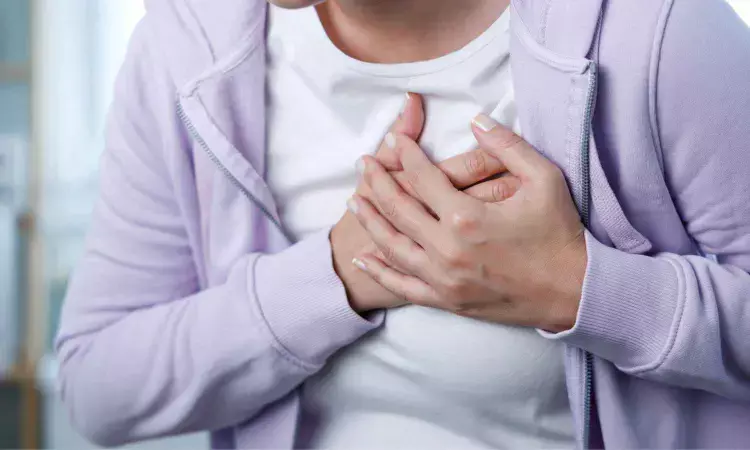- Home
- Medical news & Guidelines
- Anesthesiology
- Cardiology and CTVS
- Critical Care
- Dentistry
- Dermatology
- Diabetes and Endocrinology
- ENT
- Gastroenterology
- Medicine
- Nephrology
- Neurology
- Obstretics-Gynaecology
- Oncology
- Ophthalmology
- Orthopaedics
- Pediatrics-Neonatology
- Psychiatry
- Pulmonology
- Radiology
- Surgery
- Urology
- Laboratory Medicine
- Diet
- Nursing
- Paramedical
- Physiotherapy
- Health news
- Fact Check
- Bone Health Fact Check
- Brain Health Fact Check
- Cancer Related Fact Check
- Child Care Fact Check
- Dental and oral health fact check
- Diabetes and metabolic health fact check
- Diet and Nutrition Fact Check
- Eye and ENT Care Fact Check
- Fitness fact check
- Gut health fact check
- Heart health fact check
- Kidney health fact check
- Medical education fact check
- Men's health fact check
- Respiratory fact check
- Skin and hair care fact check
- Vaccine and Immunization fact check
- Women's health fact check
- AYUSH
- State News
- Andaman and Nicobar Islands
- Andhra Pradesh
- Arunachal Pradesh
- Assam
- Bihar
- Chandigarh
- Chattisgarh
- Dadra and Nagar Haveli
- Daman and Diu
- Delhi
- Goa
- Gujarat
- Haryana
- Himachal Pradesh
- Jammu & Kashmir
- Jharkhand
- Karnataka
- Kerala
- Ladakh
- Lakshadweep
- Madhya Pradesh
- Maharashtra
- Manipur
- Meghalaya
- Mizoram
- Nagaland
- Odisha
- Puducherry
- Punjab
- Rajasthan
- Sikkim
- Tamil Nadu
- Telangana
- Tripura
- Uttar Pradesh
- Uttrakhand
- West Bengal
- Medical Education
- Industry
Everolimus Plus Low-Dose Tacrolimus safer than tacrolimus in Pediatric Heart Transplant Recipients: JAMA

A recent clinical trial published in the Journal of American Medical Association revealed that everolimus combined with low-dose tacrolimus did not show superior efficacy in preventing rejection, cardiac allograft vasculopathy, or chronic kidney disease, but it was safe regarding overall transplant complications at 30 months and may serve as a suitable alternative to tacrolimus with mycophenolate in pediatric recipients.
Everolimus has long been considered for transplant care because of its potential to reduce rejection, cardiac allograft vasculopathy (CAV), chronic kidney disease (CKD), and cytomegalovirus (CMV). And yet, its use remains controversial, as early post-transplant introduction has been linked to higher infection-related deaths.
This trial enrolled 211 children at 25 U.S. sites between February 2018 and August 2020, with final follow-up in April 2023. The participants, with a mean age of 8.2 years, were randomized at 6-months post-transplant to receive either everolimus plus low-dose tacrolimus (107 children) or the standard regimen of tacrolimus with mycophenolate mofetil (104 children). This research tracked efficacy (MATE-3 score) and safety (MATE-6 score) over 30 months
At 30 months, both treatment groups showed comparable rates of rejection, CAV, and CKD. The mean MATE-3 score difference between the groups (−0.32) was not statistically significant. Also, everolimus did not increase safety risks, where the adjusted MATE-6 score was similar between groups and met the non-inferiority threshold of the trial.
Graft survival and freedom from major adverse transplant events were also comparable across both regimens, which reassured clinicians that everolimus does not compromise long-term outcomes when initiated 6-months post-transplant.
However, the study highlighted 2 notable advantages for the everolimus group. At 12 months, children receiving everolimus and low-dose tacrolimus demonstrated improved kidney function, measured by a higher estimated glomerular filtration rate (average gain of 10.5 mL/min/1.73 m²). Also, everolimus was linked to a 50% lower risk of CMV infection.
While everolimus did not outperform standard therapy in preventing rejection, CAV, or CKD at 30 months, these results support its safety when introduced later in pediatric patients. The added benefits of better kidney function and reduced CMV infections may influence how clinicians tailor post-transplant immunosuppression.
Source:
Almond, C. S., Daly, K. P., Albers, E. L., Alejos, J. C., Ameduri, R., Auerbach, S. R., Barkoff, L., Barnes, A. P., Bock, M. J., Butto, A., Carlo, W. F., Castleberry, C. D., Chrisant, M. R., Deshpande, S. R., Dreyer, W. J., Everitt, M. D., Feingold, B., Gonzales, S., Hollander, S. A., … Ellsworth, D. (2025). Everolimus and Low-Dose Tacrolimus After Heart Transplant in Children. JAMA. https://doi.org/10.1001/jama.2025.14338
Neuroscience Masters graduate
Jacinthlyn Sylvia, a Neuroscience Master's graduate from Chennai has worked extensively in deciphering the neurobiology of cognition and motor control in aging. She also has spread-out exposure to Neurosurgery from her Bachelor’s. She is currently involved in active Neuro-Oncology research. She is an upcoming neuroscientist with a fiery passion for writing. Her news cover at Medical Dialogues feature recent discoveries and updates from the healthcare and biomedical research fields. She can be reached at editorial@medicaldialogues.in
Dr Kamal Kant Kohli-MBBS, DTCD- a chest specialist with more than 30 years of practice and a flair for writing clinical articles, Dr Kamal Kant Kohli joined Medical Dialogues as a Chief Editor of Medical News. Besides writing articles, as an editor, he proofreads and verifies all the medical content published on Medical Dialogues including those coming from journals, studies,medical conferences,guidelines etc. Email: drkohli@medicaldialogues.in. Contact no. 011-43720751


